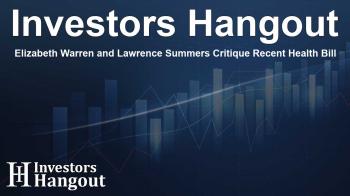Elizabeth Warren and Lawrence Summers Critique Recent Health Bill

Concerns Over Recent Legislation
Sen. Elizabeth Warren and former Treasury Secretary Lawrence Summers have expressed their worries regarding the consequences of the recently passed "One Big, Beautiful Bill". They predict significant repercussions for American families, particularly those who are financially vulnerable.
What Critics Are Saying
On social media, Warren highlighted the critical role that the Republican Party plays in the bill’s passage. She pointed out that approximately 17 million individuals could potentially lose their health care coverage due to its provisions. The senator emphasized that these changes are a direct result of Republicans prioritizing political allegiance over the welfare of the citizens.
Warren went on to explain that the implications of the bill extend beyond healthcare. She warned that it could lead to increased prices at grocery stores, rising student loan payments, and escalating utility costs, exacerbating the financial strain on families.
The Economic Ramifications
The bill proposes cuts amounting to $930 billion from programs such as Medicaid and food assistance for low-income families while also introducing green energy incentives that were part of the previous administration's agenda. Additionally, it aims to raise the Federal Government’s debt ceiling by $5 trillion.
Summers echoed Warren’s sentiments, labeling the cuts as not just cruel but also foolish. He cautioned that reducing Medicaid funding would burden hospitals with unreimbursed care costs, which would ultimately be passed on to patients, manifesting in delayed treatments and higher overall healthcare expenses.
Further Warnings from Experts
In an assessment featured in a prominent daily publication, Summers described the bill as “the harshest rollback of the American social safety net in recent history”. He emphasized the potential for this legislation to lead to a significant number of avoidable deaths over the coming decade, drawing parallels with past welfare reductions that had harmful societal impacts.
Broader Political Reactions
Other lawmakers have also weighed in on the legislation. Sen. Bernie Sanders criticized it, calling it "the most dangerous piece of legislation of our time", framing it as a gift to the wealthiest Americans. Similarly, several Republican leaders expressed reservations about the bill's potential consequences on U.S. debt ratings and the economy.
Deficit and Inflation Concerns
Republican legislators like Ron Johnson and Rand Paul have echoed concerns about the inflationary effects of the bill, reinforcing the fears that it may fuel higher deficits. The fiscal management implications could strain not only the economy but also everyday Americans’ financial capabilities.
The Role of Industry Leaders
In a surprising twist, even Tesla Inc. CEO, Elon Musk, previously an ally of the former president, has criticized the proposed bill. He described it as an excessively extravagant spending package, reiterating concerns raised by several lawmakers and analysts regarding its financial viability. Musk's comments prompted widespread discussion, as he urged legislators to reconsider how the funds would be directed.
Overall, the fallout from this legislation suggests a contentious political landscape, where the future impacts on American families and the economy will be closely monitored.
Frequently Asked Questions
What are the main criticisms of the One Big, Beautiful Bill?
Critics, including Senators Warren and Summers, argue that it will lead to significant healthcare coverage losses and increase living costs for many families.
How much is being cut from Medicaid?
The bill proposes cuts totaling $930 billion from the Medicaid program, which is likely to affect millions of Americans dependent on these services.
What are the expected outcomes of the bill's passage?
Experts anticipate higher healthcare costs and increased strain on American families, potentially leading to avoidable health repercussions.
Why is the bill controversial?
The bill has garnered criticism from both sides of the political aisle, considered by many to be a significant step back for social safety measures.
How are industry leaders reacting to this legislation?
Notably, even industry figures like Elon Musk have spoken out against the bill, calling it a troubling approach to fiscal policy.
About The Author
Contact Ryan Hughes privately here. Or send an email with ATTN: Ryan Hughes as the subject to contact@investorshangout.com.
About Investors Hangout
Investors Hangout is a leading online stock forum for financial discussion and learning, offering a wide range of free tools and resources. It draws in traders of all levels, who exchange market knowledge, investigate trading tactics, and keep an eye on industry developments in real time. Featuring financial articles, stock message boards, quotes, charts, company profiles, and live news updates. Through cooperative learning and a wealth of informational resources, it helps users from novices creating their first portfolios to experts honing their techniques. Join Investors Hangout today: https://investorshangout.com/
The content of this article is based on factual, publicly available information and does not represent legal, financial, or investment advice. Investors Hangout does not offer financial advice, and the author is not a licensed financial advisor. Consult a qualified advisor before making any financial or investment decisions based on this article. This article should not be considered advice to purchase, sell, or hold any securities or other investments. If any of the material provided here is inaccurate, please contact us for corrections.

